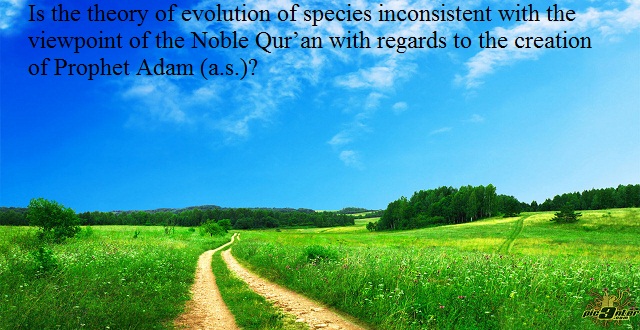
This problem is an ancient issue that had been the bone of contention of scholars; a group advocating freedom of will while another supporting compulsion and each of them presenting proofs to substantiate their viewpoints.
But interestingly, in practice, both these groups have formally recognized and accepted the notion of choice and freedom of will. In other words all these debates are only within the periphery of theoretical discussion and not in practice, clearly revealing that the concept of freedom of will is inherent to every person. And were it not for the various insinuations and whisperings, everybody would have supported this concept.
This general conscience and universal innate – one of the most lucid of all the proofs for ikhtiyar (freedom of choice) – manifests itself in various forms in man’s life; if man considered himself to be compelled in the performance of his deeds and to not possess any choice, why is it that: At times, as a result of performance or non-performance of an act, man experiences a sense of regret, and resolves to utilize his experience in the future. This state of regret occurs numerously for those who advocate the concept of jabr (compulsion); if there is no ikhtiyar, why this rue and remorse?
Everyone rebukes and censures the evil-doers; if there is jabr, why should they be rebuked in such a manner?
Those who do good deeds are praised and commended?
Everyone strives to educate their children in order that they become successful and fortunate; if everyone is compelled (in the performance of his deeds); what is the point in educating them?
All the scholars, without exception, exert themselves for the purpose of raising the standard of ethics in society?
Man expresses repentance over his blunders; if the concept of jabr is accepted, repentance becomes meaningless.
Man rues his shortcomings; why?
Universally, the criminals are subjected to trials and are exposed to intense interrogation; are these acts that are beyond one’s choice and free-will and need no interrogation and trials?
All over the world and within all communities – irrespective of whether they are materialists or Allah-worshippers – punishments have been prescribed for the criminals. But are these punishments for acts that they were compelled to perform?!
When someone transgresses upon their interests, even the advocates of the doctrine of jabr clamour for justice and, considering him to be guilty, drag him to the courts of law!
In short, if man truly had no choice of his own, what could repentance possibly mean? Why then the reproach and censure? Can one, whose hands and feet tremble involuntarily, be rebuked and criticized?
Why are those, who perform good acts, praised and encouraged? But do they possess choice of their own that they shall continue their good acts as a result of this encouragement?
Basically, with the acknowledgement of the influence of education, the concept of jabr breaks down. In addition, issues related to ethics, without acknowledging the concept of freedom of will, become totally meaningless.
If we are compelled in our acts, what is the meaning of repentance? Why should one yearn and rue? Placing a compelled person on trial is one of the most oppressive of acts, and punishing him is worse.
All these indicate that the concept of freedom of will is inherent to all humans, and in accordance with the conscience of the entire mankind. It is not just the general public, but even the learned class, the philosophers and the proponents of jabr too, in practice, accept ikhtiyar.
اأَلْجَبَرِرِيُّونَ اإِخْتِيَارِِيُّيُونَ مِنْ حَيْثُ لاَ يَعْلَمُونَ!
“Those, who profess the doctrine of ‘jabr’ are, (in practice) the proponents of the doctrine of ‘ikhtiyar’, but only they realize it not.”
It is interesting to note that the Noble Qur’an has repeatedly emphasized this issue too. In verse 39 of Suratul Naba it says:
فَمَنْ شَآءَ اتَّخَذَ إِلـى رَبِّهِ مَآباً
“So whoever desires may take refuge with his Lord.”
In other verses too great emphasis has been laid upon man’s will, and since mentioning all of them would only serve to prolong the discussion, we shall content ourselves by presenting only two verses below:
إِنَّا هَدَيْنَاهُ السَّبِيلَ إِمَّا شَاكِراً وَ إِمَّا كَفُوراً
“Surely We have shown him the way: he may be thankful or unthankful.”1
فَمَنْ شَاءَ فَلْيُؤْمِنْ وَ مَنْ شَآءَ فَلْيَكْفُرْ إِنَّا أَعْتَدْنَا لِلظَّالِمِينَ نَارًا
“So let him who please believe, and let him who please disbelieve; surely We have prepared for the iniquitous a fire.”2
The discussion regarding this issue is a very protracted one with numerous books and articles having been written in this regard. What has been mentioned has just been a superficial glance at the issue from the standpoint of the conscience and the Noble Qur’an. We continue our discussion by mentioning one important point:
Support for the issue of jabr, on the part of a group of people, did not arise only due to philosophical problems; rather, important psychological and social factors undoubtedly contributed to the birth and continuation of this belief.
Many of those, who have accepted the belief of jabr, predestination or ‘qadha and qadr’ (fate and destiny, but with the attribute of compulsion attached to them), have done so in order to escape the burden of responsibilities or to cover up their failures, which have been a consequence of their own shortcomings and negligence, or to provide for themselves a covering for their wild carnal desires (They would state: Allah (s.w.t.) knew from pre-eternity that we would consume wine; and we consume wine now in order that Allah’s (s.w.t.) knowledge does not become ignorance!)
At times the colonialist powers, in order to suppress the resistance of the people and put out the flames of anger of the nations, would make themselves dominant over the others by making use of this doctrine. They used to say: ‘Your fate, from the very beginning, had been ordained to be this; where is there any alternative except submission and happiness (over our dominance)?
By accepting this doctrine all the deeds of the criminals and the sins of the sinners would become justified and there would be no difference between an offender and an obedient person.3
The verse:
وَ مَا رَبُّكَ بِظَلاَّمٍ لِلْعَبِيدِ
“And your Lord is not in the least unjust to the servants”4
is a clear proof with regards to the issue of ikhtiyar and freedom of will, and is illustrative of this reality that Allah (s.w.t.) neither punishes anyone inexplicably nor does He increase the punishment of anyone unwarrantedly. His work is absolute justice; this is so since oppression stems from shortcomings, deficiencies, ignorance, unawareness or carnal desires, and His Holy Essence is free from all of these.
Qur’an, in its manifest verses, simultaneous to pronouncing the doctrine of jabr – which is a source of dissemination of wickedness, an approval for various kinds of evils, and a tool for the rejection of every kind of obligation and responsibility – as being incorrect, considers each person to be answerable for his own deeds and is of the view that the consequences of every person’s deeds would be directed towards that person himself.
And hence we read in a tradition that one of companions Imam ‘Ali ibne Musa al-Ridha (a.s.) asked:
هَلْ يَجْبُرُ اللٌّهُ عِبَادَهُ عَلى الْـمَعَاصِي؟
“Does Allah (s.w.t.) compel His servants to commit sins?”
فَقَالَ: بَلْ يُخَيِّرُهُمْ وَ يُـمَهِّلُهُمْ حَتَّـى يَتُوبُوا.
Whereupon he (a.s.) replied: “No. Rather, he gives them the choice and respites them until they repent.”
The companion persisted:
فَهَلْ يُكَلِّفُ عِبَادَهُ مَا لاَ يَطِيقُونَ؟
“Does He place upon them obligations that are beyond their ability to perform?”
The Imam (a.s.) said:
كَيْفَ يَفْعَلُ ذٌلِكَ وَ هُوَ يَقُولُ: وَ مَا رَبُّكَ بِظَلاَّمٍ لِلْعَبِيدِ
“How can He do such a thing when He Himself has said (in the Qur’an) ‘And your Lord is not in the least unjust to the servants?’”
The Imam (a.s.) then adds: My father Musa ibne Ja’far (a.s.) narrates from his father Ja’far ibne Muhammad (a.s.) that: “One, who is of the belief that Allah (s.w.t.) compels His servants into committing sins or places upon them obligations that are beyond their ability (to perform), do not eat the meat of the animal slaughtered by such a person, do not accept his testimony, do not offer prayers behind him and do not give him anything from the zakat! (In short, do not apply the laws of Islam to him).5
The above tradition implicitly alludes to this subtle point that the doctrine of jabr originates from the concept of ‘obligation that cannot be performed’; this is because if, on the one hand, man is compelled into committing sins while on the other hand, he is prohibited from it, this becomes a clear case of placing an obligation that cannot to be performed.6
In verse 29 of Suratul Insan, we recite:
إِنَّ هٌذِهِ تَذْكِرَةٌ فَمَنْ شَآءَ اتَّخَذَ إِلـى رَبِّهِ سَبِيلاً
“Surely this is a reminder, so whoever pleases takes to his Lord a way.”
And since it was possible that narrow-minded individuals might have interpreted the above expression to mean absolute and unqualified tafwidh (entrusting to Allah), the next verse goes on to say:
وَ مَا تَشَآؤُوْنَ إِلاَّ أَنْ يَشَآءَ اللٌّهُ
“And you do not please except that Allah please.”
And finally says:
إِنَّ اللٌّهَ كَانَ عَلِيماً حَكِيماً
“Surely Allah is Knowing, Wise.”
And this, in reality, is establishing the well-known belief of:
أَلأَمْرُ بَيْنَ الأَمْرَينِ.
“The (actual) issue is that which lies between the two (extreme) issues of total compulsion and total freedom.”
On the one hand it says: “Allah (s.w.t.) has shown the way and selecting it is upon you. On the other hand it adds: Your selection is dependent upon the Will of Allah (s.w.t.). This means that you do not possess absolute freedom and independence; rather, your strength, power and freedom of will are entirely from Allah (s.w.t.) and by His Will and permission; the moment He desires, He can take away this strength and freedom from you.”
As such, neither is it tafwidh and unqualified entrusting, nor is it compulsion; rather, it is a subtle reality that lies between these two. In other words it is a kind of freedom, which is related to Allah’s (s.w.t.) Will such that He can take it away as and when He desires so that the people can carry the burden of responsibility – which is actually the secret of their achieving perfection – upon their shoulders, while at the same time, not envisage themselves as being independent of Allah (s.w.t.).
In short, this expression is for the purpose that the people do not regard themselves as being independent of the guidance, support, grace and blessings of Allah (s.w.t.) but, during decision-making, entrust themselves to Him and place themselves under His support,.
It thus becomes clear that the reason some of the commentators, who advocate the doctrine of jabr – like Fakhr Razi – have adhered to this verse is due to the preconceived views which they had harboured in connection with the issue. Fakhr Razi says:
وَ اعْلَمْ إِنَّ هَذِهِ الْآيَةَ مِنْ جُمْلَةِ الآيَاتِ الَّتِيْ تَلاَطَمَتْ فِيْهَا أَمْوَاجُ الْجَبْرِ وَ الْقَدْرِ.
“Do know that this verse is one of the verses which indicate upon ‘jabr’ and predestination!”7
Yes, if we were to extricate this verse from the verses previous to it, there would be room for this delusion; however, in view of the fact that in one verse the effect of ikhtiyar has been mentioned while in the other verse the effect of Allah’s Will, the issue of:
أَلأَمْرُ بَيْنَ الأَمْرَينِ.
is quite plainly established.
Incredibly, the advocates of tafwidh cling on to that very verse, which speaks of total freedom of choice whereas the proponents of jabr adhere to that very verse, which speaks only of jabr – each of them wanting to justify their preconceived opinions by means of the respective verses. However, the correct comprehension of Allah’s (s.w.t.) speech (or any other speech for that matter) demands that all the verses be placed alongside each other and then, without prejudices and prejudgments, the judgment should take place.
It is likely that the last part of the verse which states….
إِنَّ اللٌّهَ كَانَ عَلِيماً حَكِيماً
“Surely Allah (s.w.t.) s Knowing, Wise.”
also alludes to this meaning. This is because the Knowledge and Wisdom of Allah (s.w.t.) necessitate that the people be left free in journeying the path towards perfection; for if it were not so, the perfection that is imposed would not be perfection at all. Besides, His knowledge and wisdom does not permit Him to compel some into performing good deeds and others into committing evil acts, and later reward the first group and punish the second.8
————————————————————————-
1. Suratul Insan (76), Verse 3
2. Suratul Kahf (18), Verse 29
3. Tafsir-e-Namuna, vol. 26, pg. 64
4. Suratul Fussilat (41), Verse 46
5. ‘Uyun Akhbar al-Ridha, as quoted in Tafsir Nurul Thaqalain, vol. 4, pg. 555
6. Tafsir-e-Namuna, vol. 20, pg. 308
7. Commentary of Fakhr Razi, vol. 30, pg. 262
8. Tafsir-e-Namuna, vol. 25, pg. 385









